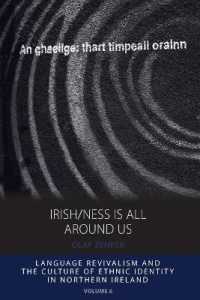- ホーム
- > 洋書
- > 英文書
- > Psychology
Full Description
This book sheds a new light on Freud, who from the beginning was aware that the psychoanalytic edifice he was constructing - which revealed in each individual an "ego not master in its own house" - had clear implications for understanding collective human behaviour, including religion, morality, and civilisation.The authors' political focus is unusual, and their choice of quotes from lesser-known sources holds great interest. Freud's interlocutors include Oskar Pfisrer, the Swiss pastor and lay analyst; Einstein; and the American diplomat William Bullitt, with whom Freud wrote a study of President Wilson, entitled Thomas Widrow Wilson: A Psychological Study. In his introduction to this book, written in 1930, Freud describes Wilson as a person for whom mere facts held no significance; he esteemed highly nothing but human motives and opinions. As a result, writes Freud, it was natural for him to ignore the facts of the real outer world, even to deny they existed if they conflicted with his hopes and wishes. In effect, Wilson's vision of America as saviour of the world led to the disastrous consequences of the 1919 Treaty of Versailles, causing William Bullitt to predict that it would make renewed international conflicts inevitable, subjecting nations to a century of future wars.Rene Major and Chantal Talagrand present psychoanalysis itself as political. What is at stake is liberation from all forms of bondage of the self, the other and the world. While focusing on the uniqueness of inner life, Freud never lost sight of humanity as a whole. Toward the end of his life, he concluded: "A great part of my life's work has been spent [trying to] destroy illusions of my own and those of mankind". By highlighting Freud's involvement in the political realities of his era, this book draws attention to the inextricable link between psychoanalytic and sociopolitical perspectives. In other words, it includes psychoanalysis in the urgent affairs of the world.
Contents
FOREWORD
Why Burn Freud's Books?
Vienna at the End of the 19th Century
Family Portrait
Kindred Spirits in Literature and Philosophy
Revenants
Questioning the Teachers
A Fortunate Contretemps
The Lure of the South
Sexuality Theories
10. Freud the Man
11. The First Circle of Followers
12. Case Histories
13. The War Years
14. Death
15. Life without Illusions
16. The Right to Psychoanalysis
17. Why War
18. The Unpromised Land
Timeline of Life Events








